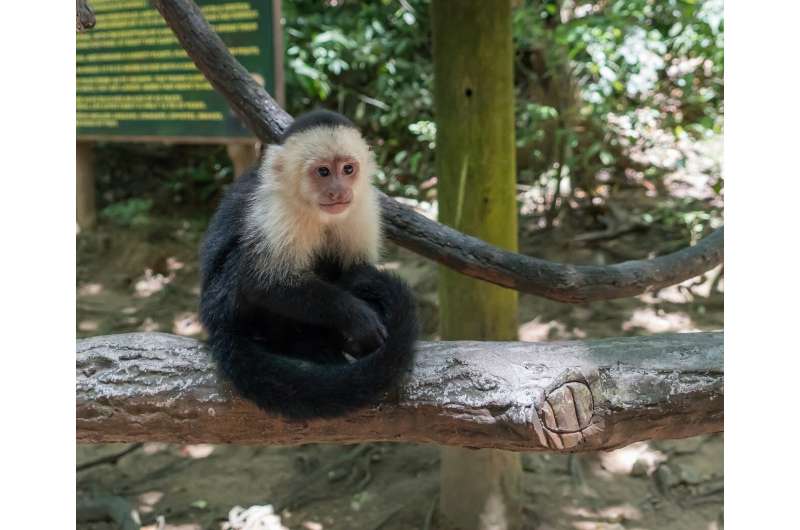Credit: Pixabay/CC0 Public Domain
A team of researchers with the University of Tokyo, Área de Conservación Guanacaste, the University of Calgary and Tulane University has reported observation of an instance of cannibalism in wild white‐faced capuchin monkeys. In their paper published on the open access site Ecology and Evolution the group describes an incident in which adult wild white‐faced capuchin monkeys consumed some of the remains of a 10-day old infant.
As the researchers note, cannibalism has been observed in a wide variety of animals, though it is rare in mammals. In this new effort, the researchers were taking part in a decades-long study of white-faced capuchins in the Santa Rosa National Park in Costa Rica. As they were observing the monkeys going about their normal daily activities, they saw a 10-day old infant fall from a tree. The mother ran to its side but could not revive it. Soon, it became clear that the infant was dead. At that point, the mother wandered away from the infant, leaving it on the forest floor. A few minutes later, a two-year-old male approached the dead infant and began nibbling on its fingers. He was joined soon thereafter by a 23-year-old alpha female who began chewing on the infant's toes and feet.
Cannibalism has been observed in other animals, the researchers note, during times of food scarcity, but that was not the case with the monkeys they were studying. They note that most often when a young capuchin monkey dies, the mother carries it off into the forest, away from other members of the group. In this instance, the mother was quite young and did not appear to know what she was supposed to do when she found her young offspring had died from its fall—that might explain why others in the group chose to eat it. The researchers note that cannibalism is rare among primates because it carries the risk of disease. The observation of cannibalism in the capuchin monkeys is the first ever seen in the species. And though they are omnivorous, they very rarely eat anything they have not killed themselves.
Notably, the young male and older female did not entirely consume the infant carcass—after eating its hands and lower extremities, they left it alone on the forest floor. Soon thereafter, the researchers retrieved the body for study purposes.
More information: Mari Nishikawa et al. Infant cannibalism in wild white‐faced capuchin monkeys, Ecology and Evolution (2020). DOI: 10.1002/ece3.6901
Journal information: Ecology and Evolution
© 2020 Science X Network
























